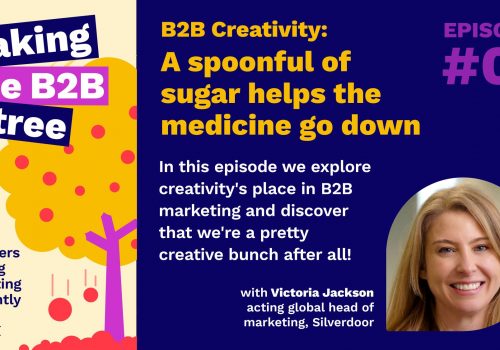We’ve enjoyed working with Yvonne Henderson, Head of Retail Brand and Communications at Gazprom Energy, for several years now. During that time Gazprom Energy has undergone its own transformation as far as brand is concerned, which makes Yvonne ideally placed to give us her views on what the real secrets are to an effective B2B strategy and how she believes companies get it both right and wrong.
What does brand mean to you?
There are many different views as to what brand really means. It can often be perceived as fluffy marketing or elitist but for me it’s much more fundamental. Jeff Bezos is widely quoted as having said, “Your brand is what other people say about you when you’re not in the room”. To me what he is talking about is reputation. Whether it is controlled, strategic, planned or not, everything and everyone out there has a brand because it’s simply your reputation. An organisation has a reputation as a provider of a service or goods but also as an employer and more widely as a corporate citizen so branding must consider all audiences.
What are the secrets to building an effective brand strategy?
For me there are three things that go into building an effective strategy:
- Authenticity – you need to understand what it is you can and want to stand for. Paying lip service to something just because you believe it will appeal to your target audience(s) will never work if you don’t truly believe in it and can prove it’s one of your strengths.
- Go beyond communication – branding is much more than just a marketing exercise because your brand is a result of everything people experience when they interact with your organisation – whether that’s speaking to a customer service advisor, completing a website form or applying for a job. So branding is as much about processes, products and people, as it is communication.
- People – don’t make the mistake of thinking that brand is all about your customers. Your employees are hugely important too because they are responsible for delivering your brand promise to your customers. A great brand reputation will also help you to attract great people into your business.
Where do you think B2B organisations mostly go wrong in terms of their brand development?
B2B organisations often don’t think of themselves as having a brand in the same way that consumer focused businesses do. However, like it or not, every company has a reputation, so you need to embrace this, shape it and control it.
B2B brands fail when they ignore the purpose and strengths of the company and focus on what looks and sounds good. This makes branding a vanity exercise, rather than something authentic and valuable. Failing to design the customer experience in a way that delivers your brand promise is also a common mistake and falling short of service expectations is a quick way to damage a brand’s reputation. And finally, not taking employees on your brand journey with you and treating them like brand ambassadors means that you leave one of the most important factors out of the process. Employees who believe in your brand purpose and are committed to improving the organisation’s reputation by delivering on its brand promises are crucial.
How do you ensure that brand is ‘lived and breathed’ effectively throughout the business and its marketing programmes?
One of the most important parts of branding that can often be overlooked is alignment. This means aligning everything the organisation does and says with its brand promise. This should start with a gap analysis to assess the current versus desired state – where are we today versus our brand promise? The alignment stage can be quite a transformative process. It can trigger significant changes in the business through which the brand becomes integral to aligning all areas including people, processes, products and communications. The brand should drive all change, improvements and ongoing quality control to ensure it becomes ingrained in your day to day way of working.
What about measurement?
There are many ways of measuring brand health and the impact of branding activities. But vanity metrics, such as awareness, are only part of the picture and shouldn’t be measured in isolation. I personally find Net Promoter Score, which is more about the emotion attached to a brand, a very useful indicator of a brand’s health and its future success. At Gazprom Energy we use a Brand Alignment Monitor methodology (developed by Mustard Research). This tracks what we say we want to deliver and how close everything is to where we want it to be. It has helped us to identify gaps that need to be addressed and demonstrate that brand is truly a measurable, commercial imperative that can link to our other key business priorities.
What methods/approaches have you taken personally to achieve brand success?
At Gazprom Energy we are still in the process of building our brand but in our latest brand definition process we made sure to involve our senior leadership team from day one and throughout the process. They really enjoyed being part of the creative stages but it was also great for them to see first-hand the effort and science that goes into branding, particularly in the discovery and definition stages. They have a new respect for it and are completely bought into it because they’ve helped to create it.
I would also recommend using agencies. I know some companies will say that it is better to do things internally, but we have found that the help of agencies who bring their own expertise to the table has been a real benefit in moving the process forward. We have also taken advice from external experts in other businesses. Listening to how they have tackled similar challenges to the ones that we faced has been very insightful and has taught us more than any textbook could.
How does brand impact key business relationships?
This is a difficult one to quantify because if you ask a customer if the brand has made a difference to their purchasing decision in B2B they will probably say no. But if you ask them whether they value your business expertise, your reputation, and your consistency they will most likely say yes. What they are valuing are the pillars on which your brand is built. Measuring Net Promoter Score and brand salience can also help you to measure the impact your brand has on your customers because these metrics will quickly tell you how positive your customers feel towards your organisation.
If you had one piece of advice for B2B marketers around effective brand strategy, what would it be?
Coca Cola’s CEO, Muhtar Kent, said, “A brand is a promise. A good brand is a promise kept.” So, my one piece of advice is to know what your promise is and then keep it!












